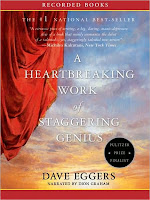 What can I say about this book that hasn't already been said? I put off reading it, despite the delicious title. After attempting to read Infinite Jest years ago, I was a bit off self-conscious postmodernism. This is a difficult book to review. The opening pages are...worthless, story-wise. "Rules and Suggestions for the Enjoyment of This Book" are almost unbearably clever. I flipped through them without thoroughly reading them. I recommend this approach. Later developments will make you glad for a passing knowledge of the self-referential (Hi! I'm writing a clever novel! See me writing a clever novel?) parody of a preface, but don't torture yourself by reading it word for word. For the first fifty or so pages, I was wondering, "Is Eggers brilliant, too clever for his own good, or both?" And then I got sucked into the story. Eggers is a brilliant writer with a gripping story: as a young man, he becomes an orphan and de facto single parent, trying to give his younger brother, Toph, the childhood he should have had. Less engaging is the considerable time Eggers spends on his tenure at Might Magazine, an above-it-all publication produced by a group of disillusioned young adults infatuated with their own cleverness. I simply didn't care about the magazine or the people devoted to it.
What can I say about this book that hasn't already been said? I put off reading it, despite the delicious title. After attempting to read Infinite Jest years ago, I was a bit off self-conscious postmodernism. This is a difficult book to review. The opening pages are...worthless, story-wise. "Rules and Suggestions for the Enjoyment of This Book" are almost unbearably clever. I flipped through them without thoroughly reading them. I recommend this approach. Later developments will make you glad for a passing knowledge of the self-referential (Hi! I'm writing a clever novel! See me writing a clever novel?) parody of a preface, but don't torture yourself by reading it word for word. For the first fifty or so pages, I was wondering, "Is Eggers brilliant, too clever for his own good, or both?" And then I got sucked into the story. Eggers is a brilliant writer with a gripping story: as a young man, he becomes an orphan and de facto single parent, trying to give his younger brother, Toph, the childhood he should have had. Less engaging is the considerable time Eggers spends on his tenure at Might Magazine, an above-it-all publication produced by a group of disillusioned young adults infatuated with their own cleverness. I simply didn't care about the magazine or the people devoted to it. The description of his mother's end-of-life saga is difficult to read, not because it's clunky or poorly written, but because Eggers has captured the truth of dying in a painful, exquisitely beautiful way. And the relationship with the younger brother is equally well-written and beautiful. Eggers uses outrageous hyperbole to great effect, and if the reader is unsure how much of a grain of salt is required in the reading, well - that's life, isn't it? It's all relative, and what's true in Eggers's mind as he raises this child is not a lie, just as an outsider's perception is its own truth. Small, pedestrian struggles, like the desperate need for a washer/dryer are given equal weight with the bigger problems such as sister Beth keeping Toph in touch with his memories by pulling out photo albums while Eggers works harder to keep Toph distracted from the fact of his orphanhood. Eggers's parenting seems at turns irresponsible (as in the hideous weekly menu of bachelor dishes) and heartbreakingly conscious (as in his evaluation of potential girlfriends based entirely on their view of Toph and their life together).
Eggers goes all the way with his cleverness, and like all risks, some pay off, while some fall flat. An extended "transcript" of an interview to be on MTV's The Real World is used to reveal extensive background on Dave, and quickly becomes tiresome. And the disclaimer that, of course, Eggers realizes that it's a cheap literary device, doesn't excuse the tedium. I don't care how postmodern you are -- don't pull me out of the story. The list of "recipes" for disgusting bachelor food, though, was surprisingly touching and hilarious. The gimmicky ending, reeking of Joyce or Salinger, somehow worked for me. It brought the story to a satisfying close on an emotional note.
I'm not sure how to sum up this review, really. There's brilliance, but a too-clever edge that could have been edited out for a better story. Worth reading? Absolutely.
FTC Source Disclosure: I purchased this book.












No comments:
Post a Comment